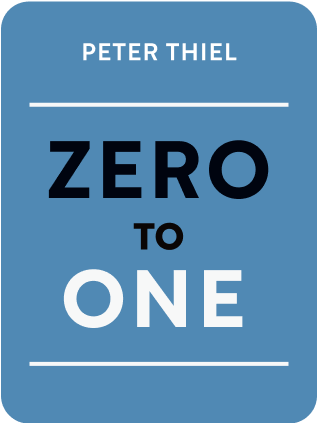

This article is an excerpt from the Shortform summary of "Zero To One" by Peter Thiel. Shortform has the world's best summaries of books you should be reading.
Like this article? Sign up for a free trial here .
Is business success a matter of luck or planning? If success is just a matter of luck, why bother with planning?
There is an ongoing debate in the business community about the relative importance of planning versus luck in determining the success of a venture. For example, Warren Buffet, Jeff Bezos, and Bill Gates all attribute their success at least partially to luck. Peter Thiel disagrees. In the chapter titled “You are not a lottery ticket,” he emphasizes the importance of planning and shares four ways of thinking about the future.
Here’s why planning should not be underestimated, according to Thiel.
You Are Not a Lottery Ticket
Today, most people equate luck with random chance, but as Peter Thiel points out in the chapter “You are not a lottery ticket,” this was not always the case. In the 18th and 19th centuries, most people believed there was a connection between your labor and your luck: The more you worked at something, the better your luck in that area became.
Ways of Thinking About the Future
Thiel says there are basically four perspectives you can have about the future, depending on how you answer two questions:
- Do you expect the future to be better or worse than the present? If you think it will be better, that makes you an optimist. If you think it will be worse, then you’re a pessimist.
- Do you believe the future can be predicted? If you believe the future is determined by a chain of cause and effect that we can study and understand, then you’ll see the future as determinate. If you see the future as a product mostly of random chance, you’ll view it as indeterminate.
Thus, the four possible perspectives are:
- Determinate Optimism: You believe you can make the future better than the present, so you plan and work toward a brighter future.
- Indeterminate Optimism: You expect circumstances to improve automatically, or feel entitled to automatic progress. This outlook may motivate you to look for opportunities for near-term improvement or profit. But it tends to dissuade you from long-term planning because you can’t predict what opportunities may come up in the future.
- Determinate Pessimism: You see the future in terms of concrete problems that you don’t have the means to solve. This motivates you to work to protect yourself from the fallout of these problems as much as possible.
- Indeterminate Pessimism: You see the future as a gloomy blur. There’s no point in planning to do anything, because you’re not likely to benefit from it, and there’s no way of knowing what you should try to protect yourself against.
A Survey of Perspectives on the Future
Thiel illustrates his discussion of ways to think about the future with examples of how different views have prevailed in different societies throughout history—and how that affected their actions.
According to Thiel, Americans generally espoused a viewpoint of determinate optimism from the founding of the American colonies up until the 1960s. He attributes many of the feats of engineering that Americans accomplished in the 19th and 20th centuries to this attitude, including:
- 1843: A tunnel under the Thames River
- 1914; The Panama Canal
- 1929-31 The Empire State building
- 1933-37: The Golden Gate Bridge
- 1956: Beginning of the Interstate Highway System
- 1961-72: 12 men on the moon
However, Thiel says that the “Baby Boomer” generation grew up immersed in such a culture of constant progress that they came to regard progress as automatic. This triggered a shift from determinate optimism to indeterminate optimism. Since the 1970s, most Americans have had an indeterminate optimistic perspective. The emphasis on a “well-rounded education” over a highly focused course of study in American school systems exemplifies this mentality.
Consequently, technological progress largely stalled in the 1970s, and positions in politics and finance supplanted technological careers as the favored route to success for most upper-class Americans. Compounding the problem, politicians tend to fixate on polls and adjust their positions to cater to whatever seems to be popular, rather than proposing long-term solutions to societal problems.
Society has also turned increasingly to insurance to mitigate unknown (or supposedly unknowable) future risks. Thiel sees government programs like Medicare and Social Security as costly insurance programs motivated by the mentality of indeterminate optimism. Similarly, in finance, people regard the market as unpredictable and try to minimize their risks by diversifying their portfolios, rather than investing directly in ventures that have clear value.
Even in high-tech startups, business strategists often advise companies to keep their options open so they can adapt to a randomly-changing environment, rather than committing to long-term plans.
Meanwhile, Thiel says that from the 1970s through the time of his writing (2014) most European societies have been characterized by indeterminate pessimism. Not knowing what to expect or feeling like they have the ability to create long-term solutions, European social and financial institutions merely operate in damage-control mode.
According to Thiel, in modern-day China, most people have a determinate pessimistic outlook on the future. They believe that there aren’t enough resources on Earth to sustain the global population (of which they comprise a significant fraction). As resources are depleted, the poorest people will be impacted first and most severely, and China’s average level of affluence is still lower than that of the West. China is investing heavily in modernization, in hopes of narrowing the gap between them and wealthier countries, but they don’t expect to fully catch up before the world’s resources are depleted. Wealthy Chinese people often try to relocate their assets to affluent Western countries, where they may be less vulnerable in the coming global resource crisis.
The Importance of Your Outlook
Thiel argues that only an outlook of determinate optimism will lead you to plan carefully enough and stick to your plans diligently enough to succeed, whether as a startup developing new technology or as an individual. Even if you’re not an entrepreneur, your long-term goal should be to be the best at something, instead of being a “well-rounded” individual who does what everybody else does and thus competes with everyone at everything.
Thiel also expresses concern over the long-term societal effects of widespread indeterminate optimism, arguing that it is not a logically tenable position: Why should we expect the future to be better if we’re not doing anything to make it better?

———End of Preview———
Like what you just read? Read the rest of the world's best summary of Peter Thiel's "Zero To One" at Shortform .
Here's what you'll find in our full Zero To One summary :
- Why some companies genuinely move the world forward when most don't
- How to build a company that becomes a monopoly (and why monopolies aren't bad)
- Silicon Valley secrets to selling products and building rockstar teams






